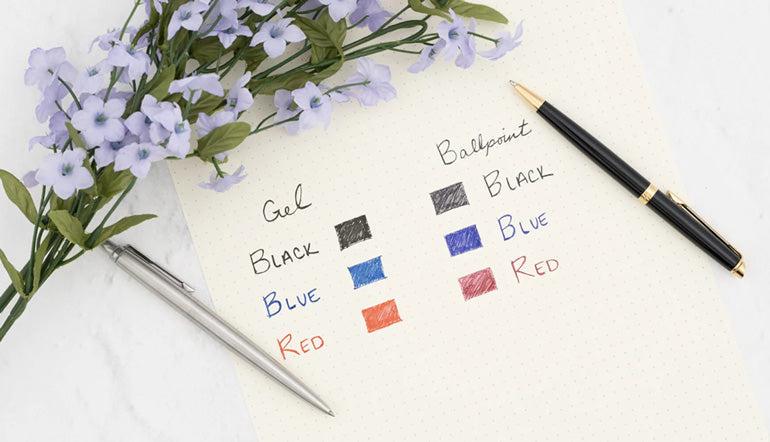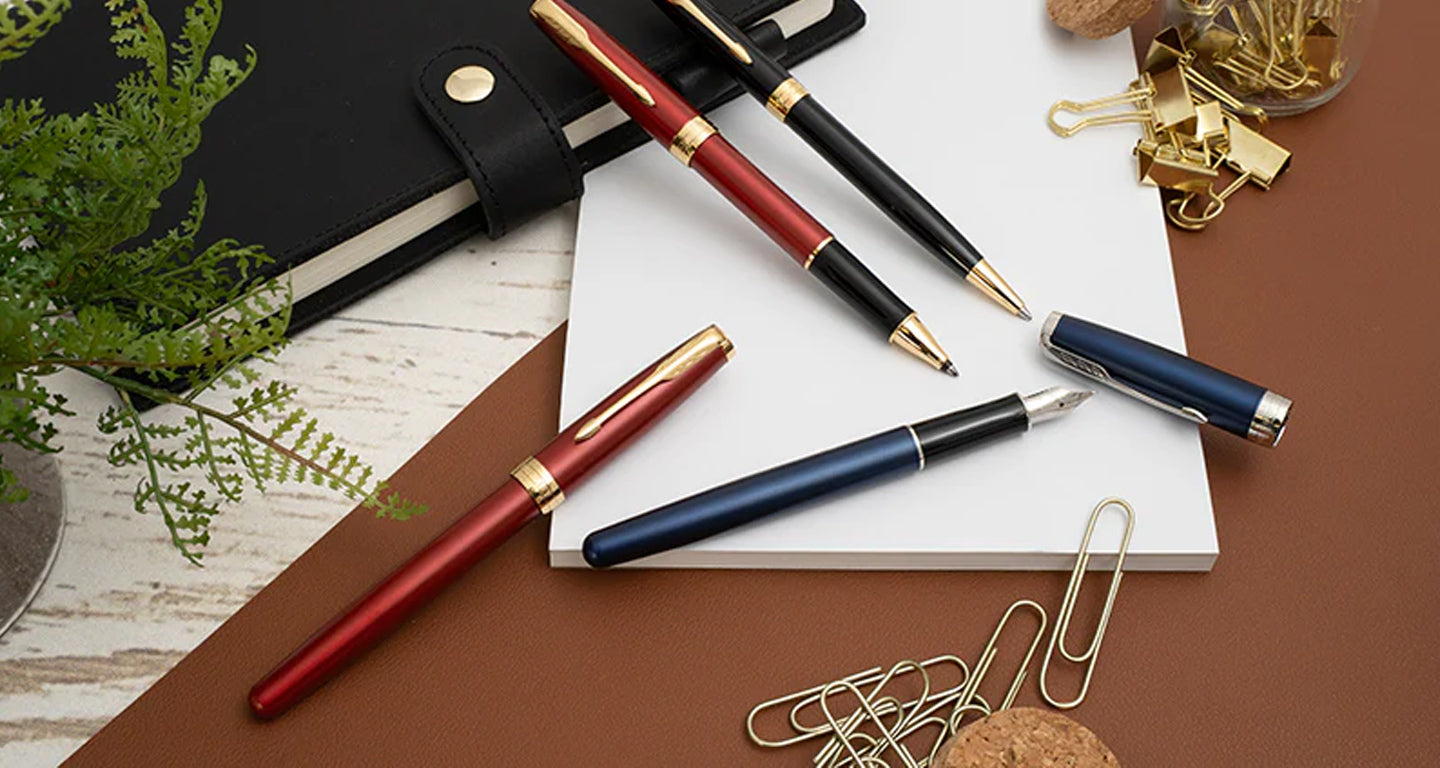
What are the Differences Between a Gel Pen vs Ballpoint Pen?
What is a Gel Pen?
A gel pen is a pen that contains a ball-and-socket mechanism whose ink is made from pigments that are suspended in a water-based gel.
This type of ink produces vibrant colors or unique additives like neon, glitter, or sheen and allows for smooth, bold writing, a feature that makes them popular for artistic purposes.

Gel Pen Ink vs Ballpoint Ink
Even though gel pens work like how ballpoint pens work, the ink composition is critically different between gel ink and ballpoint ink.
Composition of Gel Pen Ink and Ballpoint Pen Ink
The ink used in gel pens is made of pigments carried in a water-based gel suspension, a mixture of finely distributed solid particles in a liquid.
Pigments provide the vibrant, opaque colors associated with gel pens.
Ballpoint pen ink, in contrast, mostly consists of dyes dissolved in oil-based solvents.
Small caveat: some types of ballpoints use ink made of pigments, but they still use an oil-based carrier instead of gel.
Characteristics of Gel Pen Ink and Ballpoint Pen Ink
There are three main characteristic differences between gel ink and ballpoint ink: 1.) the viscosity of the ink 2.) how the ink binds to the paper and therefore how quickly it dries 3.) the color/additives it delivers.
First off, the viscosity, or liquidity, of the ink.
The ink in gel pens contains more liquid (less viscous). This creates a smoother writing experience as more ink moves more quickly through the pen tip, releasing a steady, rich line.
Ballpoint pen ink is thicker (more viscous) than gel ink (think of lava flowing versus a river flowing).
The ballpoint releases less ink, creating a thinner writing line and generally a duller color since less ink appears on the paper.

Viscosity also affects how much pressure is needed to apply the ink.
Ballpoint
More viscosity = more pressure.
Gel Pen
Less viscosity = less pressure.
Next, how the ink binds to the paper aka dry time.
For gel pens: as you write, the ink dries by being absorbed into the fibers of the paper. This means the dry time of the ink is directly connected to how long it takes for the ink to soak into the paper.
Dry times will vary depending on the additives in the ink (if the manufacturer wanted a fast drying gel pen that would soak quickly) and depending on the paper quality (the tightness of the fibers in the paper).
Helpful Tip: Paper matters. It has a huge impact on writing experience and quality not just for fountain pen users. Find out more: What is the Best Fountain Pen Paper?
Slower drying times increase the likelihood of smudging. While more liquid in the ink makes feathering and bleed through are a more common occurrence.

Ballpoint pen ink binds to the writing surface instead of sinking into it. This means it dries rapidly and, as long as the pen can grip the material, the ball in the tip rolls and applies the ink so it can write on most surfaces.
When ballpoint pen ink is applied on paper, the solvents evaporate or oxidize due to exposure to air.
Lastly, the color/additives delivered by the ink.
Gel ink is a better vehicle for pigments, glitters, metals, and opalescent because it suspends the particles in the liquid. When the liquid soaks into the paper, the solid additives are left on the top of the surface creating greater vibrancy and an opaque quality to the writing line.

Ballpoint ink is limited by the size of the particle being added to the ink and the oil’s ability to carry it.
If the particle is too large, the oil moves too slowly and clogs the mechanism. This is why ballpoints generally use dyes which dissolve into the ink over pigments that sit inside the ink.
Therefore, the aesthetic quality of the ballpoint ink is limited.
Luxury Gel Pen Highlight: The Parker Jotter

The Parker Jotter has a long history as an exceptional EDC ballpoint pen. But its little talked about gel pen alternative is quite frankly exceptional.
With all the same all metal construction for durability, addictive click ability, and iconic design, the Parker Jotter Gel Pen delivers a precision fine writing line in a vibrant, rich black ink that is a staff favorite at Dayspring Pens.
Complete with custom engraving, it is an easy go to as a writer for your daily tasks or a thoughtful gift a person will be genuinely excited to use.
What Are Gel Pens Best Used For?
Gel pens are suitable for a variety of uses.
Artistic Projects
Due to gel pens ability to deliver a variety of colors/hues, gel pens are incredibly popular for artistic work.
They also allow for greater control and smoother movement with their water-based ink.
Gel ink can be layered to add depth and dimension.
It also is generally water-proof compared to other water-based ink like fountain pen ink.
Detail-oriented Work
When doing detailed work like technical drawings, gel pens come in handy for their ability to create precise lines. The consistent ink flow also helps in maintaining neatness.
With the wide variety of colors available, you can easily color code your drawings or notes to make it easy to interpret them at a glance.
Expert Tip: Gel pens are fantastic for nurses to use to color code their charting notes.
Document Signing
Most gel pens are waterproof and archive quality. They also start writing without preparing the pen (like a fountain pen or rollerball that may need to be primed).
This makes them ideal for signing documents.
Pros and Cons of Gel Pens and Ballpoints
Gel pens and ballpoint pens both have their strong points and weaknesses. Before you pick either, here is what you need to consider.
Gel Pen Pros
- Gel pens produce vibrant colors perfect for decorative work.
- The lines are fine and precise.
- They give a smooth writing experience.
- Less writing pressure to decrease hand fatigue.
Gel Pen Cons
- Gel pens tend to be more expensive than regular ballpoint pens.
- They may skip or clog if left unused for a while.
- May not work on some paper types.
- The slower drying time increases the chances of smudging.
Ballpoint Pen Pros
- Quick-drying ink that experiences minimal smudging.
- Ballpoint pens are generally more affordable and widely available than gel pens.
- They work well with a wide variety of paper types.
- Produce a regular ink flow thus consistent lines.
Ballpoint Pen Cons
- Ballpoint pen ink colors are less vibrant than gel pens.
- Ink flow may feel less smooth compared to gel pens.
- Limited variety of ink colors available.
The table below compares some key features of ballpoint pens and gel pens:
| Feature | Gel Pens | Ballpoint Pens |
| Ink type | Pigment-based, water-based gel | Dye-based, oil-based |
| Drying time | Slower and prone to smudging if not careful | Quick-drying with minimal smudging |
| Paper compatibility | Best on smooth, thin, non-absorbent paper | Works well on almost any paper type |
| Writing experience | Smooth, glide-like | Pen has a bit of drag |
| Ink durability | Water-resistant, fade-resistant once dry | Long-lasting, less prone to fading |
| Best used for | Artistic projects, journaling, detailed work | Everyday writing, note-taking, general use |
Conclusion
Although exceedingly similar in appearance, the gel pen and the ballpoint pen are worlds apart in regards to their writing experience.
If you need a steady pen that can write on any surface with the drop of a hat, the ballpoint is the way to go.
If you are looking for a smooth, easy writer for note taking, drawing, or design work, it is hard to beat the quality of the gel pen.
Which is your favorite to use?
Leave a comment below!
And for more reading about how pens work and which pens are best for your needs, check out my other articles:
|
Sam Di Nardo is an author for Dayspring Pens, where she has honed her expertise in ballpoint, rollerball, gel and fountain pens since joining the team in 2018. From her initial role as an Engraver to becoming the Production Manager, Sam's journey has been marked by her passion for the history, manufacturing, and the unique value of gifted writing instruments. A graduate of Regent University with a degree in English Literature and a special interest in Old Norse literature, dive deeper into Sam's world and discover why she's your trusted guide in the realm of gift pens. |
Share


